PLATFORM WORKERS - THE NEW FACE OF SOLIDARITY By David Bacon The Stansbury Forum, June 2, 2024 https://stansburyforum.com/2024/06/02/platform-workers-the-new-face-of-solidarity https://davidbaconrealitycheck.blogspot.com/2024/06/platform-workers-new-face-of-solidarity.html Introduction On May 21 I went to the State Supreme Court Building in San Francisco at 350 McAllister. I went to witness oral argument in the case brought against Proposition 22, the state referendum that overturned Assembly Bill 5 in the 2020 election. Uber and Lyft and other platform/gig companies financed the referendum with $200 million in their effort to undermine the excellent provisions of AB 5 authored by then Assemblywoman Lorena Gonzalez of San Diego. AB 5 codified into law a previous Supreme Court case called Dynamex that established a very simple and solid three part test that determines who is an employee and who is a contractor. AB 5 if implemented and enforced would have made Uber and Lyff and other platform employers treat their workers as employees with the right to be protected by labor standards and the right to organize under the National Labor Relations Act. Getting into the State Supreme Court chambers turns out to be much more difficult than getting through TSA airport security. First there is the usual metal screening then there is a second screening for phones and computers, which are not permitted in the chambers. I sat in the overflow room and watched the proceedings on live feed video. My own take and the opinion reflected in the legal press is that the State Supremes are going to basically uphold 22 which will probably lead to more legislative initiatives to bring justice to gig drivers and employees. Before the hearing I met up with the President of Ride Share Drivers United, Nicole Moore and some of her members. After the hearing Nicole commented that it is a little disturbing to hear bright attorneys on the bench jousting with plaintiff and employer attorneys over fine legal points when the livelihoods of thousands of workers are at stake. The decision of the Court will be within 60 to 90 days of the hearing. The Stansbury Forum therefore is proud to present interviews with Nicole Moore and leaders of platform worker organizing in Canada, Mexico and the United States. The interviews and photos were done by David Bacon at a conference organized by the UCLA Labor Center - Global Labor Solidarity Program. Peter Olney, Co-Editor of the Stansbury Forum Foreword As part of efforts to foster cross-border labor solidarity, the UCLA Labor Center convened over 80 labor leaders and workers from the U.S., Mexico and Canada for the "Worker Solidarity in Action: A Tri-national Labor Response to the USMCA" summit held on Feb. 9-10, 2024 in Los Angeles, California. The present report, written by noted journalist David Bacon, conveys the main objective of the event-to foster transnational labor collaboration and to create a space for strategic discussions surrounding worker rights campaigns in communities across North America. This report was written, the interviews conducted, and the photographs taken by David Bacon. This is the fourth section of the report. Previous sections had contributions from workers and organizers in the maquiladoras, the auto industry, and in the domestic and home care industry. Hosted at the Los Angeles County Federation of Labor (LA Fed), in partnership with the and the Rosa Luxemburg Stiftung- Foundation-New York Office, this event took place on Feb 9-10, 2024, and builds on the Labor Center's 18-year history of fostering global labor solidarity initiatives that can play a vital role in facilitating worker rights across the globe. entitled: "Worker Solidarity in Action: A Trinational Response to the US Mexico Canada Agreement". Gaspar Rivera-Salgado, Project Director - UCLA Labor Center- Global Labor Solidarity On Valentine's Day, just three days after the Los Angeles conference concluded, workers for Uber Eats, Deliveroo and other delivery apps in Great Britain went on strike, refusing to take orders and drive meals to the companies' waiting customers. Like their coworkers in the U.S., Canada and Mexico, the UK drivers are not covered by the statutory "national living wage" of 11.44 pounds. The UK supreme court last November ruled that platform workers aren't workers at all, in the face of an organizing drive by the Independent Workers Union of Great Britain that had signed up over 3000 members. In an era where workers in one country can follow the actions of workers in another, in real time as they happen, the strike electrified platform workers across the Atlantic. JENNIFER SCOTT 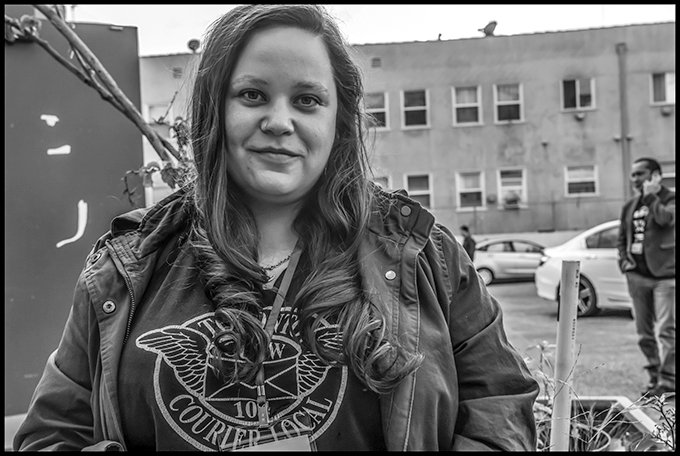 Jennifer Scott is a gig worker and the president of Gig Workers United in Canada. She lives and works in Toronto. Our union started in early 2020 with the Food Stores United Campaign, at a European company called Foodora. This was an app like Uber. Workers wanted to unionize, so we helped them. We put in the papers for the certification of their union, and 89.4% of workers in Toronto and Mississauga voted yes. So we won and that set a precedent at the labor board. Then the pandemic began and Foodora declared bankruptcy and exited Canada completely. But because of the worker power we built, we were able to get severance pay. The Federal government has a program called the WEP, for workers whose whose employers declare bankruptcy and are not not able to pay severance. We won a settlement of $4.1 million, allocated and divided among workers all over Canada. After that, we had questions. Do we want to stop? Are we happy? Do we want our rights? What do we want to do? Everyone felt that obviously, we want our rights. After a few months of talking and thinking we figured out what we wanted to do. Workers came together and created Gig Workers United, saying, "Look what we have in common." No matter what city we work in or app we work on, whether we're delivering by bike or walking or car, the problem is we don't have our rights and we want them. That's the end goal of Gig Workers United - to unionize. The main companies in Canada are DoorDash, Uber Eats, and Skip the Dishes, now owned by Just Eat. There's also Instacart and Corner Shop, which was purchased by Uber. Our Members work on different combinations of these apps. We have a very loose definition of a gig worker, and it's easy to be e a member. In Canada they misclassify us as independent contractors. We know we're not. Our work around organizing has to challenge the misclassification of gig workers, because that's how apps get away with treating us the way they do. It's why we don't have basic rights and protections. The debate over classification was a big part of the Foodora case and why it was precedent-setting. In Ontario, under the Employment Standards Act, independent contractors have no rights. But you also have dependent contractors, which is a form of employee. In the Foodora case we won because we were classified as dependent contractors. At Foodora we had to certify a bargaining unit, and after that, workers voted democratically. Presumably if we filed a petition for Uber drivers, Uber would say that we're not employees and we would have to fight that whole thing all over again. But the precedent has been set. The board looked at our case and at the relationship between the platform and the workers and made the right decision. So it doesn't have to be as intimidating or feel as uncertain now as it might have in 2018. Uber in any country always wants to control the narrative. That's why a win for us on one app or even a win in one jurisdiction is is a win for all us. The companies all work together, and workers have to work together too. A victory at Foodora or the huge fight in California around AB 5, and then the Uber initiative, all affect workers in other countries. In the UK on Friday WGB [the British gig workers' union] organized what could be the biggest strike in the history of gig work. They shut down kitchens, with workers standing outside them saying, "We're not picking up." There are videos of McDonald's with 50 or 60 orders lined up and no workers. They were declining orders. The consequence of a work stoppage is that the algorithm pays workers more for orders. Where on average they paid £3 per order, at the end of the strike Uber was offering £71 per order. That's amazing. As workers in Canada, we look at that and we're like, "OK, let's do that here." It shows us strategies and tactics that can work. We know that any app algorithm is sensitive to strike action. As workers we can manipulate that and have big wins. A strike like that not only sends a message to the boss. It also means that a worker who is working that night is going to get paid £71 an order. That might make me think twice about collective power. A great reason to go on strike. I'm excited to build my family relationships with folks in in the US. Because of the pandemic and being precarious workers, it has not really been possible to travel a lot, so we don't get to see each other. Being here is really meaningful for building those relationships. The possibility might exist at some point that an action would take take place in the U.S., Mexico and Canada at the same time. Who doesn't want that to happen? But what steps would have to be taken in order to get there? Like any aspect of organizing, it's worker to worker. I talk with my coworkers, and my coworkers say, "I want to take action." That has to happen every place, and people have to coordinate it. If we've got 50 new leaders and they want to take an action, how do we do that? Presumably we'd have to find organizations with the same set of principles in other countries. I don't think gig workers can organize in any way other than through rank and file, worker to worker organizing, whether it's locally in our communities or across borders or global action. It is all rooted in workers. As a gig worker, every day, all day long, when I'm working I am being confronted with orders - $3 for five kilometers, $3 for 15 kilometers. And I'm constantly looking at things and figuring out if the orders are good for me. Apps frequently send us emails that say, "Hey, we're making a change in how the app functions and it's going to be good for you and you're going to like it." But then what we see, and what we hear from workers all over the world, is that we fucking don't like it. It's not good for us, and we know what is and isn't. That that's the core of organizing. The people who do the work know what needs to change. When we unite together, will know how to take action together. Folks who are not workers have a role to play, an important one. But our core belief is that nobody can change your life for you. You have to do it for yourself. There's a community of interest between people in very different industries. There are lots of reasons for us to connect together, but the most important one is that employers like Uber want to bring in regressive labor policy. That's their end goal. It isn't delivering food and it's not about ride share. They want to drastically change what we think work is. Apps and gig work is coming for all work. Gig work is about lowering employment standards and changing minimums to something that is not tenable, that harms people, that harms our community. Maybe somebody has a good job now. Maybe they have a union job now. But with gig work that won't exist five years from now. So we have all the reasons in the world to work together. As members of Gig Workers United we recognize that it is necessary to build relationships internationally with other gig workers. We'll keep fighting and our relationships with each other can keep us going, can give us a hand when we need one. Now is a moment to start building that, so that a year from now, two years from now, when we need each other, we're already connected. NICOLE MOORE 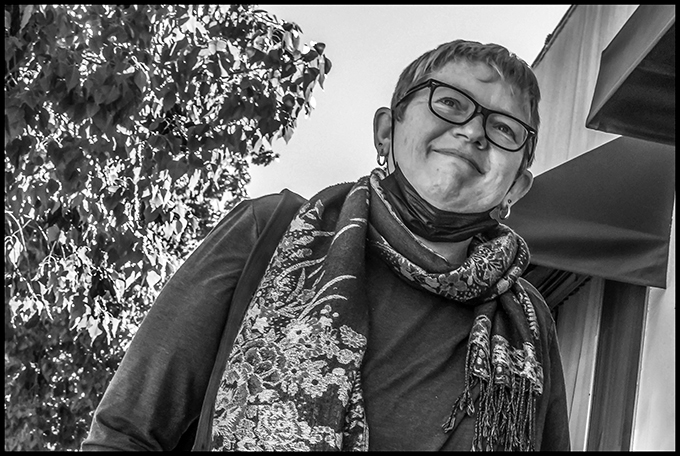 Nicole Moore is a part time Lyft driver and President of Rideshare Drivers United, the organization of 20,000 drivers in California. RDU has a democratically elected Board of Driver Members, and members who pay dues of $15/month to be eligible to vote in the election of officers, held every other year. Today RDU has chapters in Los Angeles, San Diego and the San Francisco Bay Area. Rideshare Drivers United started in the parking lot of LAX. When Uber started cutting our rates, we started talking to each other. Unlike other workers, we don't have a big room or a water fountain where we gather. We gather at airports to pick up people. A majority of us are people of color and immigrants, so this gig model is impacting people of color more than other communities. We did a couple of protests over some of the cuts and brought 50 or 75 people. But we knew it wasn't enough to really make a change. We knew we had to build substantial power. So in 2018 we took signs and left our cars and organized mini strikes on the sidewalks at the terminals where passengers are getting in and out. Then we decided we had to build bigger than just airport drivers. Not all of us work at the airport. At that time we estimated there were 400,000 to 500,000 drivers in California, so we needed to organize to scale. One of our volunteers started helping us build an Excel list. Then we realized we could actually build our own organizing app to help us recruit through social media and other venues. We wanted to build an organization where we could really communicate with each other and build real relationships. We decided that when we got to 2000 people in our organization, we would do our first public action as Rideshare Drivers United on January 30th, 2019, when the new Governor of California made the alarming conclusion that drivers should get together with companies to come up with a solution. Some of the larger labor unions were already trying to do this, but with no drivers in the room. As drivers we knew the companies were getting ready to their IPO's in 2020. They were slowly squeezing drivers to get more money, to look better for the investors. We were feeling it, getting less and less. So we said no. The the governor had barely been sworn in when we protested in front of his Los Angeles office. And instead of 50 people, we had 150. We knew our organizing model, based on connecting as humans, was working. Lawmakers in Sacramento knew that these companies were fake classifying people as indefinite contractors, and the courts agreed. They passed a law, AB 5, that incorporated the ABC test for determining who is an independent contractor. It's been used all over the country, so it's not something radical. None of us wanted to be employees of Uber, with a 40 hour work week and having to beg the boss for a vacation. Those are the things we associate with formal employment. The companies used that to feed us a line - that we wouldn't have flexibility if we were not independent contractors. We needed the state to help. So we threw down to support AB 5, but we expected pushback from our members. But instead they said, "Hell, yeah! These people are treating us like employees, so we might as well have the rights of of all the other folks to at a least minimum wage and unemployment insurance and workers comp." We had two gigantic strikes that year, the second right before Uber's IPO. That one went global. We had people striking on 6 continents because everybody knew Uber was about to make a bazillion dollars. They had cut us from $1.75 per mile to $1.20 per mile to $0.90 per mile to $0.60 per mile. It was getting worse and five thousand of us filed wage claims because we often weren't even making minimum wage. But if minimum wage is just based on when I have a passenger in the car, there's no minimum wage at all. If there are 10,000 drivers in Korea Town trying to pick up two passengers, everybody's gonna make two cents. You have to look at all of the value of our time, wait time included. The state then ruled that they owed us $1.3 billion. That was huge. When I hear people from the rideshare union in Mexico, or the platform workers as they call them, I think it's wonderful that they're they're in the same struggles that we're in. It's so great not to be alone. They have a legal system that does say they are workers with rights. But they also are fighting against unions that are trying to trade their rights for money and power. We have very similar fights here, so it's very exciting to to talk with them. We have an international alliance of platform based transport workers and and have not been able to find a partner in Mexico. Now we have a union we feel we can work with. Our deactivation report showed the violence, discrimination and and abuse drivers receive, and then we're we're fired or temporarily suspended by AI. We tell the company, "I wasn't drunk. The guy told me he was going to get me fired and get a free ride, so I shouldn't be fired. I haven't had a drink in 30 years." But we're arguing with the chat bot. There's no human in this process. Meanwhile we can't pay our rent or feed our kids. The woman driver from Mexico was talking about the same thing. We're looking at global strategies to create standards for this industry. The ILO is doing that, but we want to make sure that drivers like us are in the room when those standards are set. We're fighting global organizations, global capital, that are working to destroy labor rights for everyone. And they're going at it very deliberately and powerfully. It's no joke. All of us will be deployed through AI or some kind of platform in the future for our work. For the last hundred years, since the industrial revolution, we've tried to build workers rights. If we start at zero with the AI revolution, we're going to be in hell, a 21st century industrial revolution. ZAIRA BARINO TOVAR 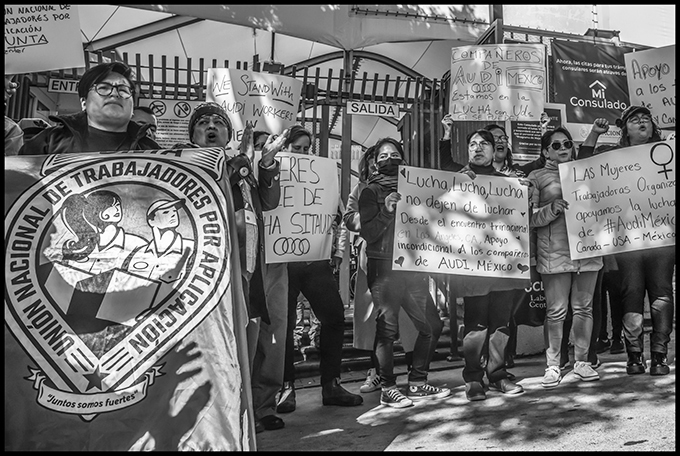 Zaira Barriño Tovar is the secretary for gender of the National Union of Application Workers in México. The union includes drivers for Uber, bicycle workers, and motorcycles that deliver food at home, as well as peoplewho deliver products for Amazon and Mercado Libre. I have worked in these jobs and been paid badly. We do not have any benefits or rights. The applications have sold us he idea that we are our own bosses, that we are freelance partners, but in reality they don't want to recognize us as workers, particularly as workers on digital platforms. Mexican law regarding workers does cover people who work with transnational companies, but digital platforms do not recognize us as workers and or give us the legal benefits that this requires. The Federal Labor Law, although it talks about workers, does not consider us as workers either. The bad thing about this is that they are transnational companies that come to our country. set up shop, and don't even give benefits to the workers. In Mexico there is no law that defines us as workers or non-workers. Federal labor law doesn't doesn't recognize or deny us worker status. Outsourcing has supposedly been made illegal and disappeared, so digital platform companies are going against the law because outsourcing no longer exists. So we are demanding a reform saying that digital platform workers are recognized as workers.. This is a very masculine sector and women are only 10% of the workforce, but these 10% worldwide suffer a lot of gender violence. Sometimes you arrive at an address and you don't know what will happen on the street because you are a woman. As Secretary of Gender, in October we had a meeting with women working on digital platforms on an international level. Colleagues came from Spain, Brazil, Chile, Colombia, and other countries. We all wrote a letter to the ILO, asking for a report specifically on workers on digital platforms. We have been a registered union for 3 years at the federal level. We also have sections in the States of Mexico and Colima, and in the city of León. In Tijuana, we are close to organizing a new one. We have an organizing committee there, and sent a delegation from Mexico City to help. We want to start ones in Monterrey and Guadalajara, which are two of the largest cities. But although we have recognition under the law, we do not have the right to bargain collectively. And since the companies do not recognize us as workers, we cannot force them to sign a collective agreement. Our most important demand is that those companies sit down to negotiate with us, and that the Government of Mexico requires them to do this. The most important thing for us is to reach 30% membership, to be able to make a demand on these companies and represent the majority of the workers. The most important is Uber because it has a super dirty, anti-union history. This was discovered by prosecutors in the Panama Papers. Although we have 30% of the workers, which is the normal legal requirement, who knows if they are going to comply. We thought when our membership hit 30%, that Uber and other companies might create white unions. Then we could fight this by organizing to remove those unions, as other colleagues have done. At Audi there was a protection union, but the workers all got together and got it out. So we can do that if we have to. But we have to come together as workers to fight them. Companies are looking for a special organization that is not a union, they call Decalogue. And this decalogue says that we are not workers, that we are service providers, that they pay us fees, that our job is at their mercy, and that we are only protected from accidents during delivery time. Obviously that would be terrible. The companies hold these organizations' money. But many people are waking up and saying "No, I am a worker, I work 12 hours, I provide the motorcycle, the car, the bicycle, so I need them to give me benefits." We tell them, first of all, that they have to recognize themselves as workers. As a platform worker, we ask, "Do you have accidents? No one protects you if you die. No company is going to be responsible for you. You provide the money for spare parts and gasoline. Don't you think we have rights as workers?" Then you say, "Well, if I provide everything, I deserve the rights of a worker." There is another union, but we call it a yellow union, one that is with the company. They pretend they are on the side of workers, but in truth they are charros. Some of the people who work on digital platforms are migrants in Mexico. Today we have a humanitarian problem of Haitian migrants, and many of these Haitians are working on digital platforms. Recently in the news a young Haitian who was hired by a construction contractor died and the company did nothing. We want to make this stop. Our fellow migrants are vulnerable, far from their country. There are also a good portion of LGBT women and some gay men as well. They are victims of homophobia and discrimination. We have relationships with similar groups of platform workers in other countries. We coordinate with groups in Argentina, Spain, Colombia, Uruguay and Brazil. We also work with groups from other unions. MUHAMMAD EJAZ BUTT 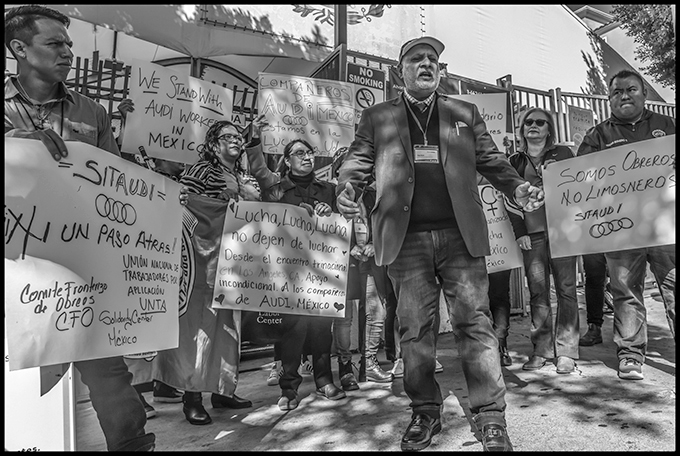 Muhammad Ejaz Butt is the general secretary of the I-Taxi Worker Association of Toronto, and President of the Toronto Limo Driver Association. He is also secretary of the 20-country International Alliance of App-Based Transport Workers. We have filed a complaint against Uber and those unions that have made under the table agreements, first in UK, then in US, and now in Canada. In any country, unions must recognize the drivers, the gig workers, not just deal with the companies. Any organization of Uber workers should be an organization run by the drivers themselves, 100%. Uber used to terminate any account for a driver at any time. Now, if a driver has lost his position he can contact with the UFCW without being a member of that union. Then they will arbitrate the case. However, last year fewer than 1000 people registered as members under that agreement. The union doesn't show clearly the advantages and disadvantages of that agreement. That is why I resigned from UFCW. In our organization, there are four points to our program. First, drivers need a minimum wage, so we would accept employee status if it gave us opportunities and rights like regular employees, including union rights. Second, we need a minimum shift of nine hours that includes waiting time. Sometimes Uber will give a driver only 3 hours. The minimum wage should apply to all nine hours. Third, Uber has to stop deactivating the accounts of drivers for small complaints. Sometime a customer is not right or he's drunk. So we want fairness in deactivations. Last, and most critical, Uber must be transparent. If I pick up customer and drive from A to to B, Uber will only show me what I get. They never show me how much they charge. The Uber agreement says they charge me 25%, but maybe they are charging 40% or 45%. One day soon they will come to the table and agree with us. Canada has already decided that by 2030 vehicle emissions must be zero and the vehicles must be electric. That will be a big expense for drivers like us. Auto workers and drivers need to talk together about this, and here we've been able to start. CRYSTAL ROMERO Crystal Romero is the press secretary at the LA County Federation of Labor. She formerly worked as an organizer with the port truckers campaign of the Teamsters Union. Organizing port truck drivers at the ports of LA and Long Beach has always been an uphill battle, because they have been classified as independent contractors, rather than being recognized properly as employees. Unfortunately, the majority of the trucking industry seems to believe that truck drivers are independent contractors, despite the law and numerous cases before the NLRB and other tribunals, which have stated that drivers are employees. The ABC test established the criteria for determining what constitutes an independent contractor, and what constitutes an employee. But there's disagreement even among the drivers. We need a lot of education to prove to the drivers themselves that they actually are misclassified employees. Even among the drivers it's always been an uphill battle to get them to recognize that their employers are taking advantage of them. Employers often just choose to ignore AB 5, so we're still seeing active misclassification at the ports, which makes organizing a battle. A trucking company will claim, "no, no, no, these guys are not employees." So you have to fight out the employee issue, and ask for an NLRB union election. Drivers make abysmally low rates. They've got to do multiple loads a day in order to break even. Some truck drivers actually make a negative income, and owe the company money. They are responsible for purchasing the trucks themselves. Each costs a quarter of a million dollars, and the drivers have to pay the taxes and insurance. Maintenance, tires, gasoline, all of that comes out of their own pockets. Essentially drivers are paying to work for multi-billion dollar global companies like Amazon. A lot of positive changes have taken place, however the transition deadline to zero emission vehicles is going to be a huge barrier for a lot of misclassified truck drivers. How can we expect a low wage worker to finance a half-million dollar electric truck? A lot of the problems of the past are going to come back to haunt us if we don't address misclassification now. I talked about the combination of passing laws and legal actions with Mexican gig workers. Gig workers there know that they're getting the short end of the stick, despite a few saying they're good with what Uber is doing. A big difference is the willingness of a lot of app drivers to recognize the problems and confront them head on. Here we've had 30 or 40 years of deregulation, and the ideology of the independent contractor has really taken hold in the trucking industry. That is not as present in the app-based drivers today, so that's certainly a difference. But in all of these cases the problem is to get workers to establish their own agency, and get people to say, "Yeah. I'm a misclassified employee. I do have rights." Legal action and political action could be an answer for the situation in Mexico, or one of the answers. Still, even here we've passed a wonderful law, but we still have billion-dollar corporations that skirt it. There are no real mechanisms of enforcement, or ways to keep these companies accountable that actually affects them in their pocketbooks. That's an issue that we see across the labor movement. So it's not the full strategy. I think it's just two prongs in a multiple prong approach. In Mexico they are looking at organizing unions specifically for gig workers. Independent unions are part of the solution for them - rideshare and driver unions that can cater to the needs of these workers in a much better way than a very large union representing many different industries. There's value in everything though. When you align with a very powerful union, like the Teamsters, you know you have more political clout. But I think one of the wonderful things that we've learned here is that we're all doing similar work. We all have very similar demands, and we're all fighting these battles in our respective jurisdictions. So how much more powerful could we be when we start really joining forces?And Uber continues to be enemy number one to workers everywhere. WORKING COACHELLA Photographs of the farmworker community of the Coachella Valley by David Bacon - Coachella Library, 1500 Sixth St., Coachella, CA Through August 15, 2024 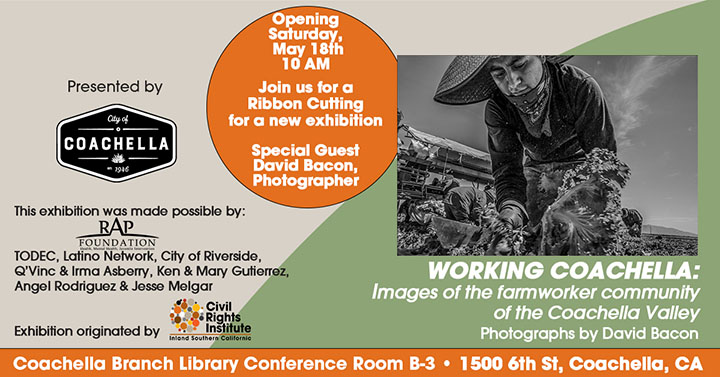 INTERVIEW WITH DAVID BACON AT THE WORKING COACHELLA EXHIBITION IN RIVERSIDE Click here: https://www.instagram.com/p/C2yAtHDPc5Q/ David Bacon's Working Coachella - Labor Heritage Power Hour with Chris Garlock https://www.listennotes.com/podcasts/labor-heritage/david-bacons-working-coachella-FGTeo-nqcuX/ STRAWBERRY WORKERS MAY DAY MARCH Photographs by David Bacon See the full set of photos here Presentation by David Bacon and Ann Lewis about the politics of the "immigration crisis" Http://ouleft.org/wp-content/uploads/4thmonda-immigration-bacon-lewis.mp4 BROOKE ANDERSON PODCAST #8 David came up as a union organizer with the United Farm Workers and United Electrical Workers, then spent decades as a photographer, photojournalist, labor reporter, and radio host covering labor, migration, and global economy. In this week’s episode, we talk David’s journey from organizer to photojournalist, his early influences, the role of movement photographers, the importance of media workers taking collective action to support their labor rights, journalists speaking out to support a ceasefire in Gaza, and advice for new photographers developing their photographic practice. MAS QUE UN MURO Las comunidades fronterizas y sus movimientos de justica social Fotografias de David Bacon Fototeca de Zacatecas Pedro Valtierra Fernando Millapando 406, Centro Historico, Zacatecas Marzo - Mayo, 2024 Cinco Entrivistas sobre esta exposicion, en el Museo Nacional de las Culturas del Mundo, CDMX: Part 1: https://www.youtube.com/watch?v=6eix0HEStpc Part 2: https://www.youtube.com/watch?v=FO4IIBPs06U Part 3: https://www.youtube.com/watch?v=VHtY-fgtsjs Part 4: https://www.youtube.com/watch?v=Xm_MNrEX2Mw Part 5: https://www.youtube.com/watch?v=MpwSuBbgAQs La imagen de una cruz en el cementerio de Holtville, en California, Estados Unidos, con la leyenda “No olvidados”, con la que activistas religiosos reconocen a los migrantes muertos sin identidad, recibe al público de la exposición Más que un muro, de David Bacon. Durante la inauguración, la directora del MNCM, Alejandra Gómez Colorado, manifestó que, desde hace años, este recinto complementa su discurso histórico y etnográfico con reflexiones que vienen desde la fotografía y el arte contemporáneo. Una línea acorde con el trabajo de Bacon, “una expresion dura y cruda de la vida que transcurre de uno y otro lado de la frontera México-Estados Unidos”. Esta obra fotográfica dijo por su parte la jefa de la Unidad de Política Migratoria, Registro e Identidad de Personas, de la Segob, Rocío González Higuera, permiten acercarse a las historias, retos, éxitos y fracasos de cada persona que migra, desde dos puntos: “El primero, la protección de la memoria contra el paso del tiempo, es decir, colocar la lente y los sentimiento sobre objetos y personas que nos permiten evocar que la frontera es un cúmulo de historias en desarrollo; el segundo, es la expresión de posturas frente a los procesos de movilidad, particularmente la migración irregular”. Bacon, fotógrafo, escritor y activista social, comenzó a documentar las vidas y los movimientos sociales de migrantes, trabajadores agrícolas y comunidades afectadas por la globalización, hace casi cuatro décadas. El fotógrafo detalló que su aproximación a estas realidades inició en 1986, siendo trabajador de una fábrica y sindicalista con United Farm Workers. A lo largo de este tiempo, indicó, ha podido registrar cómo la política migratoria implementada por su país devino en una “política de muerte”, al orillar a quienes buscan el sueño americano a transitar por sitios peligrosos como el desierto de Sonora-Arizona. En la línea fronteriza que atraviesa el desierto cual se ubican con exactitud 4,000 etiquetas forenses de restos recuperados de personas identificadas, y casi 2,000 de personas sin identificar. El visitante debe llenar estas fichas, acto que conmemora por unos instantes esas vidas perdidas No obstante, anotó David Bacon, la frontera es también tierra de vivos: “Los otrora pequeños pueblos de Ciudad Juárez y Tijuana son ciudades de millones. La frontera es el escenario de algunas de las luchas sociales más agudas de México. Los trabajadores de las fábricas organizan sindicatos independientes, mientras que los agrícolas se declaran en huelga en los campos de Baja California”. En ese sentido, finalizó, las cerca de 30 fotografías que integran Más que un muro, “nos permiten ver a la gente, sus luchas por los derechos y la igualdad, combatiendo la histeria antiinmigrante y antimexicana”. Pacific Media Workers Guild, CWA Local 39521, adopted a resolution supporting the Labor Call for a Ceasefire in Gaza: https://mediaworkers.org/guild-joins-calls-for-immediate-ceasefire-in-gaza/ WHEN WE SPOKE OUT AGAINST WAR Unearthing the history of protest against the wars in Iraq and Afghanistan Photographs © by David Bacon https://www.flickr.com/photos/56646659@N05/52759801492/in/album-72177720306862427/ BOOKS - LIBROS MORE THAN A WALL / MAS QUE UN MURO 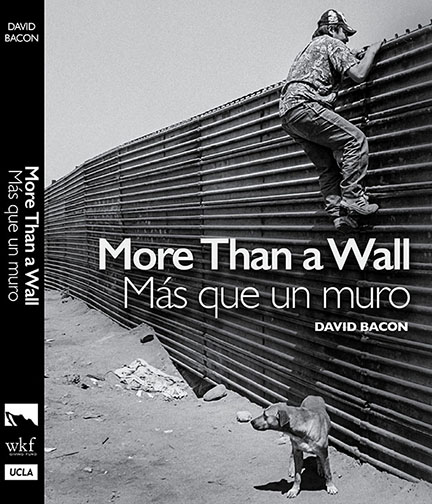 More Than a Wall / Mas que Un Muro explores the many aspects of the border region through photographs taken by David Bacon over a period of 30 years. These photographs trace the changes in the border wall itself, and the social movements in border communities, factories and fields. This bilingual book provides a reality check, to allow us to see the border region as its people, with their own history of movements for rights and equality, and develop an alternative vision in which the border can be a region where people can live and work in solidarity with each other. - Gaspar Rivera-Salgado David Bacon has given us, through his beautiful portraits, the plight of the American migrant worker, and the fierce spirit of those who provide and bring to us comfort and sustenance. -- Lila Downs Published by El Colegio de la Frontera Norte with support from the UCLA Institute for Labor Research and Education and the Center for Mexican Studies, the Werner Kohlstamm Family Fund, and the Green Library at Stanford University Price: $35 plus postage and handling To order, click here: https://david-bacon-photography.square.site/product/more-than-a-wall-mas-que-un-muro/1?cp=true&sa=true&sbp=false&q=false "The "border" is just a line. It's the people who matter." - JoAnn Intili, director, The Werner-Kohnstamm Family Fund IN THE FIELDS OF THE NORTH / EN LOS CAMPOS DEL NORTE 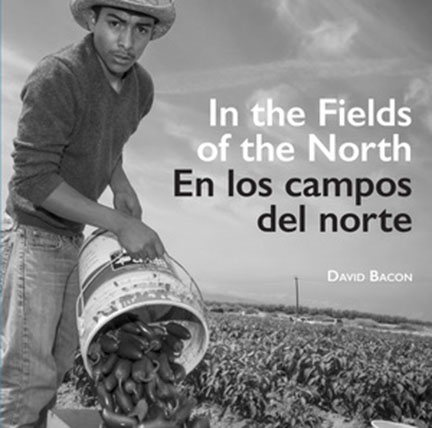 Photographs and text by David Bacon University of California Press / Colegio de la Frontera Norte 302 photographs, 450pp, 9”x9” paperback, $34.95 (in the U.S.) order the book on the UC Press website: ucpress.edu/9780520296077 use source code 16M4197 at checkout, receive a 30% discount En Mexico se puede pedir el libro en el sitio de COLEF: https://www.colef.mx Los Angeles Times reviews In the Fields of the North / En los Campos del Norte - click here 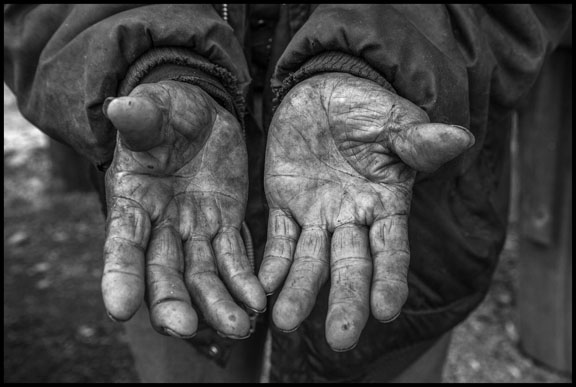 WORK AND SOCIAL JUSTICE: The David Bacon Archive exhibition at Stanford Libraries https://exhibits.stanford.edu/bacon/browse Exhibited throughout the pandemic in the Cecil H. Green Library at Stanford. The online exhibition (https://exhibits.stanford.edu/bacon), which includes additional content not included in the physical show, is accessible to everyone, and is part of an accessible digital spotlight collection that includes significant images from this body of work. For a catalog: (https://web.stanford.edu/dept/spec_coll/NonVendorPubOrderform2017.pdf) Red Lens Episode 6: David Bacon on US-Mexico border photography Brad Segal: On episode 6 of Red Lens, I talk with David Bacon. David Bacon is a California-based writer and documentary photographer. A former union organizer, today he documents labor, the global economy, war and migration, and the struggle for human rights. We talk about David's new book, 'More than a Wall / Mas que un muro' which includes 30 years of his photography and oral histories from communities & struggles in the U.S.-Mexico border region. https://www.youtube.com/watch?v=Nvs6SyXsM-4 Host Mitch Jeserich interviews David Bacon, a photojournalist, author, broadcaster and former labor organizer. He has reported on immigrant and labor issues for decades. His latest book, More Than A Wall, is a collection of his photographs of the border and border communities spanning three decades. Exploitation or Dignity - What Future for Farmworkers UCLA Latin American Institute Based on a new report by the Oakland Institute, journalist and photographer David Bacon documents the systematic abuse of workers in the H-2A program and its impact on the resident farmworker communities, confronted with a race to the bottom in wages and working conditions. https://www.youtube.com/watch?v=UXKa2lHJXMs David Bacon on union solidarity with Iraqi oil worker unions Free City Radio - CKUT 27/10/2021 - https://soundcloud.com/freecityradio/oct-27-2021-ckut-27102021-david-bacon-on-union-solidarity-with-iraqi-oil-worker-unions Organizing during COVID, the intrinsic value of the people who grow our food Sylvia Richardson - Latin Waves Media How community and union organizers came together to get rights for farm workers during COVID, and how surviving COVID has literally been an act of resistance. https://latinwavesmedia.com/wordpress/organizing-during-covid-the-intrinsic-value-of-the-people-who-grow-our-food/ Report Details Slavery-Like Conditions For Immigrant Guest Workers Rising Up With Sonali Kohatkar https://www.oaklandinstitute.org/report-details-slavery-conditions-immigrant-guest-workers The Right to Remain http://www.franknews.us/interviews/415/the-right-to-remain Beware of Pity http://www.franknews.us/interviews/525/beware-of-pity En Español Ruben Luengas - #EnContacto Hablamos con David Bacon de los migrantes y la situación de México frente a los Estados Unidos por ser el principal país de llegada a la frontera de ese país. https://rubenluengas.com/2021/03/video-mexico-estados-unidos-migracion-y-suenos-rotos-encontacto/ Jornaleros agrícolas en EEUU en condiciones más graves por Covid-19: David Bacon SomosMas99 con Agustin Galo Samario https://www.youtube.com/watch?v=YWQSvM9s1lw "Los fotógrafos tomamos partido" Entrevista por Melina Balcázar Moreno - Milenio.com Laberinto http://www.milenio.com/cultura/laberinto/david_baconm-fotografia-melina_balcazar-laberinto-milenio_0_959904035.html David Bacon comparte su mirada del trabajo agrícola de migrantes mexicanos en el Museo Archivo de la Fotografia http://www.cultura.cdmx.gob.mx/comunicacion/nota/0038-18 Online Photography Exhibitions Documentary Matters - View from the US Social Documentary Network Four SDN photographers explore themes of racial justice, migration, and #MeToo https://www.youtube.com/watch?v=fWl-uENA7SQ&t=1641s There's More Work to be Done Housing Assistance Council and National Endowment for the Arts This exhibition documents the work and impact of the struggle for equitable and affordable housing in rural America, inspired by the work of George “Elfie” Ballis. https://www.thereismoreworktobedone.com/david-bacon Dark Eyes A beautiful song by Lila Downs honoring essential workers, accompanied by photographs https://www.youtube.com/watch?v=bdC2gE3SNWw A video about the Social Justice Photography of David Bacon: https://drive.google.com/file/d/14TvAj5nS08ENzWhw3Oxra4LMNKJCLF4z/view In the FIelds of the North Online Exhibit Los Altos History Museum https://www.losaltoshistory.org/exhibits/in-the-fields-of-the-north/ Virtual Tour - In the Fields of the North History Museum of Tijuana Recorrido Virtual de la Exposicion - En los campos del norte Museo de Historia de Tijuana https://www.facebook.com/542258639265202/videos/659536991515786 THE REALITY CHECK - David Bacon blog Other Books by David Bacon - Otros Libros Illegal People -- How Globalization Creates Migration and Criminalizes Immigrants (Beacon Press, 2008) | |
Copyright © 2024 David Bacon Photographs and Stories, All rights reserved. you're on this list because of your interest in david bacon's photographs and stories Our mailing address is: David Bacon Photographs and Stories address on request Oakland, Ca 94601 | |